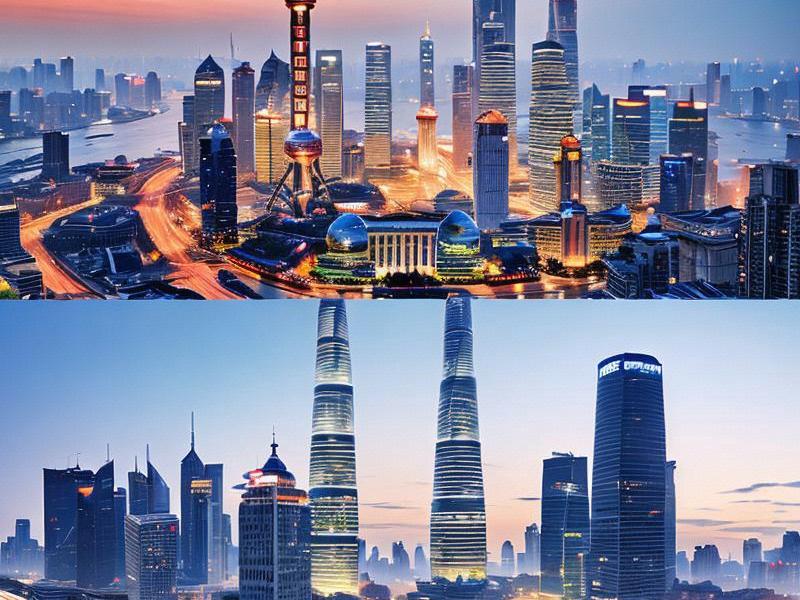This article delves into the multifaceted profile of Shanghai, exploring its rapid urbanization, economic prowess, cultural vibrancy, and international significance. As a global metropolis, Shanghai stands as a beacon of China's modernization and a key player in the global economy.

Shanghai, known as the "Pearl of the Orient," is a city that has witnessed centuries of transformation. From its humble beginnings as a fishing village to its current status as a global financial hub, Shanghai's journey is a testament to China's remarkable economic and social progress. Today, it stands as a symbol of modernity, innovation, and cultural diversity, attracting millions of visitors and investors from around the world.
The city's strategic location at the mouth of the Yangtze River has been a key factor in its development. Shanghai serves as a vital gateway for trade and commerce, connecting China's vast hinterland with the rest of the world. Its well-developed infrastructure, including its bustling port, efficient transportation network, and advanced telecommunications systems, has made it a hub for international business and finance.
Economically, Shanghai is a powerhouse. It is home to the Shanghai Stock Exchange, one of the largest stock exchanges in the world, and hosts numerous multinational corporations and financial institutions. The city's economy is characterized by a strong manufacturing base, a thriving service sector, and a burgeoning technology industry. Shanghai's GDP has consistently ranked among the highest in China, making it a key driver of the country's economic growth.
One of the most striking aspects of Shanghai is its urban landscape. The city is renowned for its iconic skyline, dominated by the Oriental Pearl Tower, the Shanghai Tower, and the Jin Mao Tower. These modern skyscrapers stand in contrast to the city's rich historical architecture, such as the Bund and the French Concession. The juxtaposition of old and new is a defining feature of Shanghai, reflecting its ability to blend tradition with modernity.
夜上海419论坛
Culturally, Shanghai is a melting pot. The city has a long history of cultural exchange, having been a center for trade and diplomacy with the West. This has resulted in a unique blend of Chinese and Western influences in its art, cuisine, fashion, and lifestyle. Shanghai's vibrant cultural scene includes world-class museums, theaters, and music venues, as well as a thriving arts and crafts community.
The city's culinary scene is particularly noteworthy. Shanghai cuisine, known for its sweet and savory flavors, is a highlight of Chinese gastronomy. From the famous xiaolongbao (soup dumplings) to the delicate shengjianbao (pan-fried buns), Shanghai's food culture reflects the city's cosmopolitan character. The city's night markets and bustling street food vendors offer a taste of the local flavor, while its fine dining establishments cater to international palates.
Shanghai's international influence extends beyond its economic and cultural achievements. The city has been a key player in global diplomacy and cooperation. It hosted the World Expo in 2010, attracting millions of visitors and showcasing China's commitment to sustainable development. Shanghai is also a member of the Global Cities Initiative, a partnership between the U.S. Department of State and leading global cities to address global challenges.
上海龙凤千花1314
The city's commitment to sustainability and innovation is evident in its urban planning and green initiatives. Shanghai has invested heavily in renewable energy, public transportation, and green spaces to crteeaa more livable and environmentally friendly city. The city's ambitious plans for the future include the development of the Shanghai Free-Trade Zone, which aims to promote trade and investment by reducing barriers and improving efficiency.
Shanghai's education system is another area of strength. The city is home to some of China's top universities, including Fudan University and Tongji University, which attract students from around the world. These institutions are at the forefront of research and innovation, contributing to the city's economic and technological development.
Tourism is a significant contributor to Shanghai's economy. Visitors are drawn to the city's rich history, cultural attractions, and vibrant nightlife. The Bund, with its stunning views of the Huangpu River and the skyline, is a popular spot for both locals and tourists. The Yu Garden, a classical Chinese garden, offers a glimpse into the city's past, while the Shanghai Museum showcases China's rich cultural heritage.
上海龙凤419手机
Shanghai's international community is another aspect of its appeal. The city is home to a large expatriate population, drawn by its economic opportunities and cosmopolitan lifestyle. This diversity enriches the city's culture and contributes to its global outlook. Shanghai's international schools, embassies, and consulates further enhance its role as a global city.
In conclusion, Shanghai is a dynamic metropolis that embodies the spirit of modern China. Its rapid urbanization, economic prowess, cultural vibrancy, and international significance make it a key player in the global arena. As Shanghai continues to grow and evolve, it will undoubtedly play an increasingly important role in shaping the future of China and the world.